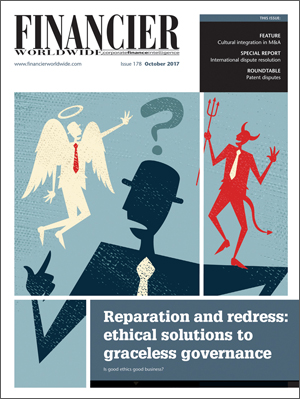International dispute resolution
October 2017 | SPECIAL REPORT: INTERNATIONAL DISPUTE RESOLUTION
Financier Worldwide Magazine
A dispute confined to a single nation is one thing, but when a disagreement erupts across international borders, the complexities involved, maybe even the stakes, are usually higher. Disputes in an international context may well be subject to a gamut of unfamiliar local laws, language and customs – realities which complicate the challenge of achieving an equitable resolution. Add to the mix the need to effectively manage multijurisdictional dispute budgets and timelines, and it becomes clear that international dispute resolution can be decidedly problematic.
FORUM: Impact of AI and technology on litigation
FW moderates a discussion on the impact of AI and technology on litigation between Tony Sykes at IT Group UK Ltd and Darren Pauling at KPMG.
When to provide for litigation, arbitration, mediation or a combination of each
Latham & Watkins Each method of dispute resolution has its own features that may be benefits or downsides, depending upon your perspective and circumstances. In many cases, parties select either court litigation or arbitration, depending upon what suits them...
Overview of third-party funding internationally
McCarthy Tétrault LLP The use of third-party capital to fund legal disputes has become increasingly prevalent in recent years, both domestically within certain jurisdictions and internationally. Through third-party funding, an entity with no legal status in a dispute will fund...
Is international arbitration a reliable forum for dispute resolution?
Quinn Emanuel Urquhart & Sullivan LLP In the nearly 60 years since the Convention on the Recognition and Enforcement of Foreign Arbitral Awards (New York Convention) entered into force, several factors have come to influence the reliability of international arbitration as a forum..
International enforcement of judgments and arbitration awards
Watson Farley & Williams LLP Sometimes dispute types are like busses, nothing for a long time and then several come at once. Often it is just coincidence. Sometimes, track records or industry specialisation tends to generate more of the same type of work. However, increases...
Witness evidence in international commercial arbitration
Peter & Partners Whether in real or fictional trials, witness evidence often captures the popular imagination. It is exciting to pit the advocate’s art against the professed recollections of the witness. Usually it is the fearless defence lawyer in a murder trial who bores...
A note to general counsel: protecting foreign investments using investment treaties
Shearman & Sterling LLP In early 2017, a Canadian mining company found its most important mining asset in a Latin American country subject to unexpected legislative changes that virtually wiped out the value of the mine. In examining the company’s potential recourses, the...
The 2016 Russian guidelines on future BITs: have your cake and eat it
Khrenov & Partners A system of bilateral investment treaties (BITs) is expanding every year with more and more getting negotiated. It is becoming very common for investors to structure their investments in such a way as to ensure not only the most efficient tax regime...
Q&A: Pre-empting and managing shareholder disputes
FW moderates a discussion on pre-empting and managing shareholder disputes between Ben Walton at Forsters LLP, Noelle M. Reed at Skadden, Arps, Slate, Meagher & Flom LLP and Affiliates, Deborah Finkler at Slaughter and May, Toby Robinson at Travers Smith LLP, and Jamie Maples at Weil, Gotshal & Manges (London) LLP.
CONTRIBUTORS
Forsters LLP
IT Group UK Ltd
Khrenov & Partners
KPMG
Latham & Watkins
McCarthy Tétrault LLP
Peter & Partners
Quinn Emanuel Urquhart & Sullivan LLP
Shearman & Sterling LLP
Skadden, Arps, Slate, Meagher & Flom LLP and Affiliates
Slaughter and May
Travers Smith LLP
Watson Farley & Williams LLP
Weil, Gotshal & Manges (London) LLP


